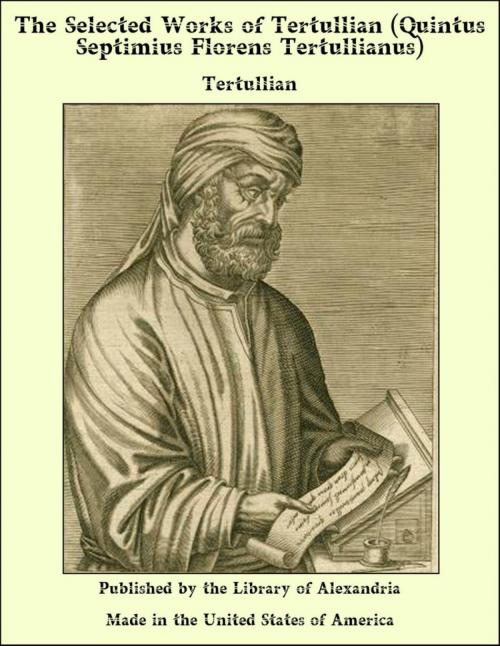The Selected Works of Tertullian (Quintus Septimius Florens Tertullianus)
Nonfiction, Religion & Spirituality, New Age, History, Fiction & Literature| Author: | Tertullian | ISBN: | 9781465588432 |
| Publisher: | Library of Alexandria | Publication: | March 8, 2015 |
| Imprint: | Language: | English |
| Author: | Tertullian |
| ISBN: | 9781465588432 |
| Publisher: | Library of Alexandria |
| Publication: | March 8, 2015 |
| Imprint: | |
| Language: | English |
WE are accustomed, for the purpose of shortening argument, to lay down the rule against heretics of the lateness of their date. For in as far as by our rule, priority is given to the truth, which also foretold that there would be heresies, in so far must all later opinions be prejudged as heresies, being such as were, by the more ancient rule of truth, predicted as (one day) to happen. Now, the doctrine of Hermogenes has this taint of novelty. He is, in short, a man living in the world at the present time; by his very nature a heretic, and turbulent withal, who mistakes loquacity for eloquence, and supposes impudence to be firmness, and judges it to be the duty of a good conscience to speak ill of individuals. Moreover, he despises God’s law in his painting, maintaining repeated marriages, alleges the law of God in defence of lust, and yet despises it in respect of his art. He falsities by a twofold process—with his cautery and his pen. He is a thorough adulterer, both doctrinally and carnally, since he is rank indeed with the contagion of your marriage-hacks, and has also failed in cleaving to the rule of faith as much as the apostle’s own Hermogenes. However, never mind the man, when it is his doctrine which I question. He does not appear to acknowledge any other Christ as Lord, though he holds Him in a different way; but by this difference in his faith he really makes Him another being,—nay, he takes from Him everything which is God, since he will not have it that He made all things of nothing. For, turning away from Christians to the philosophers, from the Church to the Academy and the Porch, he learned there from the Stoics how to place Matter (on the same level) with the Lord, just as if it too had existed ever both unborn and unmade, having no beginning at all nor end, out of which, according to him, the Lord afterwards created all things.
WE are accustomed, for the purpose of shortening argument, to lay down the rule against heretics of the lateness of their date. For in as far as by our rule, priority is given to the truth, which also foretold that there would be heresies, in so far must all later opinions be prejudged as heresies, being such as were, by the more ancient rule of truth, predicted as (one day) to happen. Now, the doctrine of Hermogenes has this taint of novelty. He is, in short, a man living in the world at the present time; by his very nature a heretic, and turbulent withal, who mistakes loquacity for eloquence, and supposes impudence to be firmness, and judges it to be the duty of a good conscience to speak ill of individuals. Moreover, he despises God’s law in his painting, maintaining repeated marriages, alleges the law of God in defence of lust, and yet despises it in respect of his art. He falsities by a twofold process—with his cautery and his pen. He is a thorough adulterer, both doctrinally and carnally, since he is rank indeed with the contagion of your marriage-hacks, and has also failed in cleaving to the rule of faith as much as the apostle’s own Hermogenes. However, never mind the man, when it is his doctrine which I question. He does not appear to acknowledge any other Christ as Lord, though he holds Him in a different way; but by this difference in his faith he really makes Him another being,—nay, he takes from Him everything which is God, since he will not have it that He made all things of nothing. For, turning away from Christians to the philosophers, from the Church to the Academy and the Porch, he learned there from the Stoics how to place Matter (on the same level) with the Lord, just as if it too had existed ever both unborn and unmade, having no beginning at all nor end, out of which, according to him, the Lord afterwards created all things.















